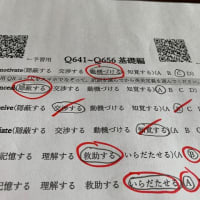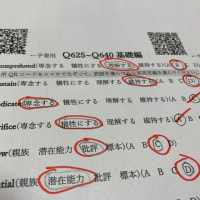英語はやさしい問題をたくさんこなしてから難しい問題に取り組むようにすると効率よく習得できます。現在、センター試験では六か所整序問題が毎回三問出題されます。最初から本番さながらの六か所整序問題に取り組むよりも、まず五か所整序問題をたくさんこなした方が英語の語順を効率的に学べます。
以下に、1990年から1992年のセンター試験で出題された五か所整序問題を和訳ヒントつきで紹介します。大学入試の整序問題の多くは和訳ヒントなしです。しかし和訳ヒントつきのやさしい問題もできない段階から過去問に取り組んでも力はつきません。
(1)Soon, more Japanese people will have a five-day workweek.
The increase in leisure time (more opportunities / them / to enjoy / will provide / with) outdoor activities.(1990)まもなく、より多くの日本人が週休2日制になるだろう。余暇の増加で野外活動を楽しむ機会がもっと増えるだろう。
(2)Recent rise in the price of land have meant that many people can no longer (afford / buy / houses / of / to) their own.(1990)最近の土地価格の上昇は多くの人々がもはや自分の家を買うことができなくなったことを意味した。
(3)Some people are apt to consider their own way of life as being the normal one
and to (differ / from it / life-styles / look down on / that).(1990)一部の人々は自身の生活様式を普通の生活様式とみなしがちで、それと異なるライフスタイルを見下しがちである。
(4)You want to make a telephone call from your friend's house.
You say : “Do you (I / if / mind / your telephone / use)?”(1990)あなたは友人の家で電話をかけたい。あなたは言う。「電話を使ってよろしいでしょうか」
(5)You want to ask your sister her opinion of a new shop around the corner.
You say:"What do you (has just opened / the new shop / of / think / which) around the corner?"(1990)あなたは、姉(妹)に角を曲がった所の新しい店について彼女の意見を聞きたい。
あなたは「角を曲がった所に開店したばかりの新しい店をどう思う?」と言う。
(6)Despite years of study, many Japanese students find (difficult / it / themselves / to make / understood) in English.(1991)長年勉強しているにもかかわらず、多くの日本人学生は英語で自分を理解してもらうのが難しいと感じる。
(7)We had a flat tire on the way here, but a truck driver (be passing us / change / helped / just happened to / who) it.(1991) ここに来る途中でタイヤがパンクしたが、たまたま通りかかったトラックの運転手がタイヤを交換するのを手伝ってくれた。
(8)I don't think my father is willing to lend us the car, but I'll see (can / I / if / into it / talk him ).(1991)父はわれわれにクルマを貸したがらないと思うが、説得できるかどうかやってみよう。
(9)When we meet someone for the first time, we usually form (an opinion / as to / is / that person / what) like. (1991)われわれは誰かに初めて会うとき、通常その人がどのような人かについての意見を持つ。
(10)“Mr Smith's talking on another phone.
Please (and I'll / as soon as / he's free / hold on a minute / put you through).”(1992)スミス氏はただいま別の電話に出ています。少々お待ちいただければ、終わり次第おつなぎします。
(11)I went to the new shop to buy a sweater, but they had ( from / I was / so many / that / to choose) completely at a loss.(1992)私は新しく開店した店にセーターを買いに行ったのだが、あまりにも選択する余地があって、全く途方に暮れてしまった。
(12)In Japan people often perform activities in groups,
and (Japanese people travel / more clearly than / nothing / shows this / the way in which).(1992) 日本人はしばしば団体で活動することが多く、日本人の旅行の仕方ほどこれをはっきり示すものはない。
和訳と解答
(1)The increase in leisure time (will provide them with more opportunities to enjoy) outdoor activities.
(2)Recent rise in the price of land have meant that many people can no longer (afford to buy houses of )their own.
(3)Some people are apt to consider their own way of life as being the normal one and to (look down on life-styles that differ from it).
(4)You want to make a telephone call from your friend's house. You say : “Do you (mind if I use your telephone)?”
(5)You want to ask your sister her opinion of a new shop around the corner.You say:"What do you (think of the new shop which has just opened) around the corner?"
(6)Despite years of study, many Japanese students find (it difficult to make themselves understood) in English.
(7)We had a flat tire on the way here, but a truck driver (who just happened to be passing us helped change) it.
(8)I don't think my father is willing to lend us the car, but I'll see (if I can talk him into it).
(9)When we meet someone for the first time, we usually form (an opinion as to what that person is) like.
(10)“Mr Smith's talking on another phone. Please (hold on a minute and I'll put you through as soon as he's free).”
(11)I went to the new shop to buy a sweater, but they had (so many to choose from that I was) completely at a loss.
(12)In Japan people often perform activities in groups, and (nothing shows this more clearly than the way in which Japanese people travel).
以下に、1990年から1992年のセンター試験で出題された五か所整序問題を和訳ヒントつきで紹介します。大学入試の整序問題の多くは和訳ヒントなしです。しかし和訳ヒントつきのやさしい問題もできない段階から過去問に取り組んでも力はつきません。
(1)Soon, more Japanese people will have a five-day workweek.
The increase in leisure time (more opportunities / them / to enjoy / will provide / with) outdoor activities.(1990)まもなく、より多くの日本人が週休2日制になるだろう。余暇の増加で野外活動を楽しむ機会がもっと増えるだろう。
(2)Recent rise in the price of land have meant that many people can no longer (afford / buy / houses / of / to) their own.(1990)最近の土地価格の上昇は多くの人々がもはや自分の家を買うことができなくなったことを意味した。
(3)Some people are apt to consider their own way of life as being the normal one
and to (differ / from it / life-styles / look down on / that).(1990)一部の人々は自身の生活様式を普通の生活様式とみなしがちで、それと異なるライフスタイルを見下しがちである。
(4)You want to make a telephone call from your friend's house.
You say : “Do you (I / if / mind / your telephone / use)?”(1990)あなたは友人の家で電話をかけたい。あなたは言う。「電話を使ってよろしいでしょうか」
(5)You want to ask your sister her opinion of a new shop around the corner.
You say:"What do you (has just opened / the new shop / of / think / which) around the corner?"(1990)あなたは、姉(妹)に角を曲がった所の新しい店について彼女の意見を聞きたい。
あなたは「角を曲がった所に開店したばかりの新しい店をどう思う?」と言う。
(6)Despite years of study, many Japanese students find (difficult / it / themselves / to make / understood) in English.(1991)長年勉強しているにもかかわらず、多くの日本人学生は英語で自分を理解してもらうのが難しいと感じる。
(7)We had a flat tire on the way here, but a truck driver (be passing us / change / helped / just happened to / who) it.(1991) ここに来る途中でタイヤがパンクしたが、たまたま通りかかったトラックの運転手がタイヤを交換するのを手伝ってくれた。
(8)I don't think my father is willing to lend us the car, but I'll see (can / I / if / into it / talk him ).(1991)父はわれわれにクルマを貸したがらないと思うが、説得できるかどうかやってみよう。
(9)When we meet someone for the first time, we usually form (an opinion / as to / is / that person / what) like. (1991)われわれは誰かに初めて会うとき、通常その人がどのような人かについての意見を持つ。
(10)“Mr Smith's talking on another phone.
Please (and I'll / as soon as / he's free / hold on a minute / put you through).”(1992)スミス氏はただいま別の電話に出ています。少々お待ちいただければ、終わり次第おつなぎします。
(11)I went to the new shop to buy a sweater, but they had ( from / I was / so many / that / to choose) completely at a loss.(1992)私は新しく開店した店にセーターを買いに行ったのだが、あまりにも選択する余地があって、全く途方に暮れてしまった。
(12)In Japan people often perform activities in groups,
and (Japanese people travel / more clearly than / nothing / shows this / the way in which).(1992) 日本人はしばしば団体で活動することが多く、日本人の旅行の仕方ほどこれをはっきり示すものはない。
和訳と解答
(1)The increase in leisure time (will provide them with more opportunities to enjoy) outdoor activities.
(2)Recent rise in the price of land have meant that many people can no longer (afford to buy houses of )their own.
(3)Some people are apt to consider their own way of life as being the normal one and to (look down on life-styles that differ from it).
(4)You want to make a telephone call from your friend's house. You say : “Do you (mind if I use your telephone)?”
(5)You want to ask your sister her opinion of a new shop around the corner.You say:"What do you (think of the new shop which has just opened) around the corner?"
(6)Despite years of study, many Japanese students find (it difficult to make themselves understood) in English.
(7)We had a flat tire on the way here, but a truck driver (who just happened to be passing us helped change) it.
(8)I don't think my father is willing to lend us the car, but I'll see (if I can talk him into it).
(9)When we meet someone for the first time, we usually form (an opinion as to what that person is) like.
(10)“Mr Smith's talking on another phone. Please (hold on a minute and I'll put you through as soon as he's free).”
(11)I went to the new shop to buy a sweater, but they had (so many to choose from that I was) completely at a loss.
(12)In Japan people often perform activities in groups, and (nothing shows this more clearly than the way in which Japanese people travel).






















※コメント投稿者のブログIDはブログ作成者のみに通知されます